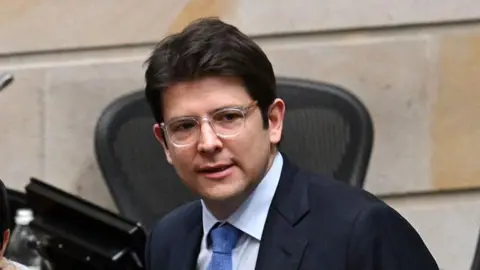In a shocking turn of events at a campaign rally in the Colombian capital of Bogota, presidential candidate Miguel Uribe Turbay was shot multiple times, sustaining critical injuries, including two gunshot wounds to the head. The incident, which occurred on Saturday while he was addressing a small crowd gathered in a park, has sent shockwaves across the nation and raised concerns about the safety of political figures in a country still grappling with violent sentiments linked to its tumultuous history.
Miguel Uribe Turbay, aged 39 and a member of the Centro Democratico party, was reportedly shot three times, and the severity of his injuries has placed him in critical condition at a local hospital, according to reports emanating from Colombian media sources. Law enforcement officials responded swiftly, apprehending a suspect at the scene of the attack, though further details about the assailant have not been disclosed. This tragic event brings into focus the precarious nature of politics in Colombia, where candidates often face threats to their safety, and violent attacks are not uncommon.
The Centro Democratico party has explicitly condemned the violent act, highlighting how such hostility threatens the lives of political leaders and overall democratic processes in Colombia. In a statement, they underscored that this attack not only endangers Uribe’s life but also poses a severe threat to the principles of democracy and freedom in the country.
Witnesses present during the rally have reported chaotic scenes, with cellphone footage capturing the exact moment the shots were fired, leading attendees to flee in sheer panic. These disturbing images reflect the actual danger faced by political candidates in Colombia, where the legacy of violence still looms large over the electoral process.
Condemnation of the attack has also come from the government led by leftist President Gustavo Petro, who characterized the shooting as a “categorical and forceful” act of violence against both Uribe and the democratic ideals for which he stands. Petro’s administration has voiced that such violence should not be tolerated, and it must be addressed to uphold the sanctity of democratic engagement in the political arena.
Miguel Uribe Turbay’s political journey is marked by personal tragedy. He is the son of Diana Turbay, a prominent journalist who was murdered in 1991 during an ill-fated rescue attempt that followed her kidnapping by the infamous Medellin drug cartel led by Pablo Escobar. This haunting legacy adds a layer of complexity to Uribe’s candidacy as it intertwines personal loss with the broader narrative of Colombia’s ongoing battle against violence and political strife.
As Uribe Turbay announced his intention to run for the Colombian presidency in the upcoming elections scheduled for the following year, he was seen as a significant player within the political establishment. His candidacy is expected to attract support from various sectors of society as he aims to navigate through the turbulent political landscape and attempt to provide solutions to the myriad problems facing Colombia today.
Reflecting on this terrifying incident, the collective reaction from local and international communities underscores the urgent need for enhanced security measures for political candidates in Colombia. Measures must be in place to safeguard those aiming to participate in the democratic process, allowing them a platform to voice their ideologies without the looming threat of violence. As the country awaits Uribe’s recovery, the act of violence serves as a critical reminder of the challenges lurking within political dynamics, urging authorities to reinforce the principles that protect democratic engagement.



